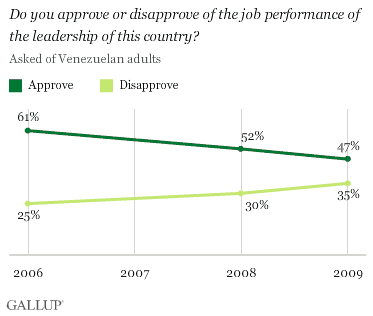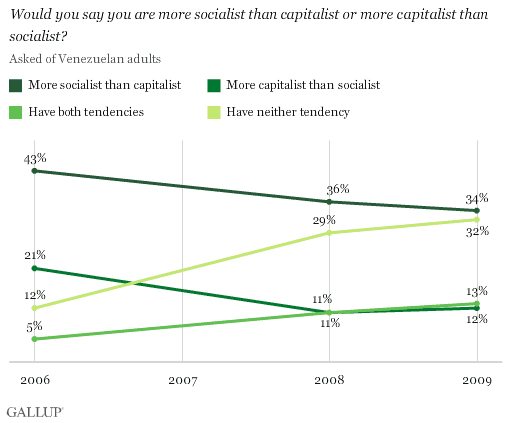WASHINGTON, D.C. -- President Hugo Chavez's popularity among Venezuelans has waned in recent years. Less than half of Venezuelans (47%) in August 2009 said they approved of Chavez' job performance -- down from 61% in late 2006 when he was elected to a second six-year term.

Through more than a decade in power, Chavez has managed to continually style himself as a populist "revolutionary" leading poor Venezuelans in a struggle against powerful capitalist elites. His success in that regard is reflected in Venezuelans' responses to a recent Gallup survey -- this year, 52% said the country is headed toward a socialist revolution, though this is down from 60% in 2008.
However, whether Venezuelans endorse such a revolution is a different question. In the past two years, the government has more aggressively nationalized companies in areas considered "strategic" to the country's interests. Concurrently, Venezuelans' tendency to identify themselves with the socialist ideology championed by the president has declined. About one-third of Venezuelans (34%) now say they personally consider themselves more socialist than capitalist, down from 43% in 2007. However, the shift does not imply that more Venezuelans are embracing capitalism. Instead, 32% now say they do not consider themselves socialist or capitalist, up from 12% in 2007; this suggests a greater resistance among Venezuelans to define themselves in these mutually exclusive terms.

Venezuelans' decreased likelihood to identify themselves as more socialist than capitalist comes at a time when rising inflation rates and declining oil prices have weakened the country's economic and social stability. This year, 30% of Venezuelans said economic conditions in their city or area are improving, down from 47% in 2008 and 63% in 2007. Electricity and water shortages have become frequent, and violent crime is rampant in much of the country. This year, 23% of Venezuelans said they feel safe walking alone in their areas at night, the second-lowest figure among the 67 countries in which Gallup asked the question.
Moreover, Chavez may no longer be as successful using anti-U.S. sentiment to consolidate support, particularly since the Obama administration took office in January 2009. This year, half of Venezuelans (50%) said they approve of the leadership in the United States, a substantial rise from 27% in 2006 and 35% in 2008. These results are relatively consistent across income categories: 51% of the poorest one-fifth of Venezuelans approve of U.S. leadership, as do 51% of the richest one-fifth.
Conversely, concern about the heavy hand Chavez has demonstrated in the recent wave of nationalizations may be growing. The proportion of Venezuelans who said people in the country can feel very confident their private property will be respected by the government has dropped to 40% this year, from 52% in 2007. And 44% of Venezuelans currently agree that life is very hard for those who oppose the government, up from 36% in 2008.
Bottom Line
Recent public opinion trends suggest that with his promise of a better future losing credibility and deprived of a rallying point in widespread opposition to U.S. leadership, Chavez's socialist "revolution" has lost some momentum among the Venezuelan people.
For complete data sets or custom research from the more than 150 countries Gallup continually surveys, please contact worldpollpartners@gallup.com or call 202.715.3030.
Survey Methods
Results are based on face-to-face surveys of approximately 1,000 Venezuelan adults each conducted in November 2005, December 2006, September 2008, and August 2009. For results based on the total sample of national adults, one can say with 95% confidence that the maximum margin of sampling error is ±3.5 percentage points. The margin of error reflects the influence of data weighting. In addition to sampling error, question wording and practical difficulties in conducting surveys can introduce error or bias into the findings of public opinion polls.
